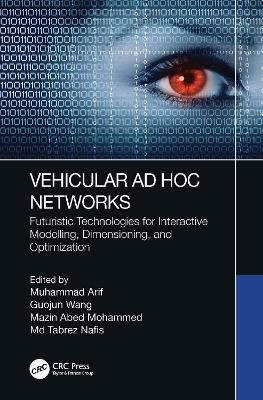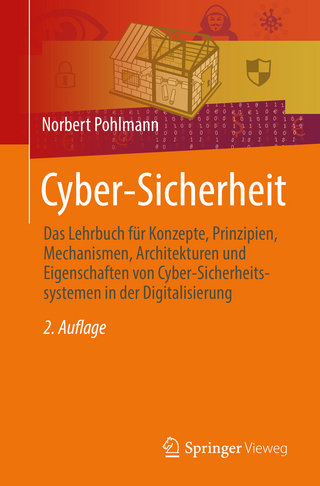
Vehicular Ad Hoc Networks
CRC Press (Verlag)
978-0-367-74253-9 (ISBN)
With the evolution of technology and sudden growth in the number of smart vehicles, traditional Vehicular Ad hoc NETworks (VANETs) face several technical challenges in deployment and management due to less flexibility, scalability, poor connectivity, and inadequate intelligence. VANETs have raised increasing attention from both academic research and industrial aspects resulting from their important role in driving assistant system.
Vehicular Ad Hoc Networks focuses on recent advanced technologies and applications that address network protocol design, low latency networking, context-aware interaction, energy efficiency, resource management, security, human-robot interaction, assistive technology and robots, application development, and integration of multiple systems that support Vehicular Networks and smart interactions.
Simulation is a key tool for the design and evaluation of Intelligent Transport Systems (ITS) that take advantage of communication-capable vehicles in order to provide valuable safety, traffic management, and infotainment services. It is widely recognized that simulation results are only significant when realistic models are considered within the simulation tool chain. However, quite often research works on the subject are based on simplistic models unable to capture the unique characteristics of vehicular communication networks. The support that different simulation tools offer for such models is discussed, as well as the steps that must be undertaken to fine-tune the model parameters in order to gather realistic results. Moreover, the book provides handy hints and references to help determine the most appropriate tools and models. This book will promote best simulation practices in order to obtain accurate results.
Dr. Muhammad Arif is currently working in the School of Computer Science in Guangzhou University, China. He received his BS degree in Computer Science from the University of Sargodha, Pakistan in 2011. He obtained his MS degree in Computer Science from COMSATS Islamabad 2013 Pakistan. He received his PhD degree from Guangzhou University, China. His research interests include Artificial intelligence, big data, cloud computing, and cyberspace security, data mining, image processing, medical image processing, Privacy, Security, and E-learning. Currently, he is working privacy and security of vehicular networks. Previously he was a lecturer at the University of Gujrat, Gujrat, Pakistan. He completed masters and bachelor degrees in Pakistan. He is the author of more than 40 SCIE journal publications, and more than 20 conference publications and a number of Best Paper Awards in the international conferences, including iSCI 2019. He have 2 SCI highly cited papers. He has more than 720 citations, according to Google Scholar. His H-Index is 15 and the i10-Index is 21. He is the Editorial board member of International Journal of Advanced Intelligence Paradigms (IJAIP) and to International Journal of Computational Systems Engineering (IJCSysE). He is a reviewer of many well-known journals, including IEEE Transaction on Vehicular Technology, IOT Journal, Plos-One, Sensors, Vehicular Communications and Journal of Network and Computer Applications, etc. He has participated in many international conferences as Programme committee member, Session Chair, Technical Programme Committee, or International Program Committees. He is the programme chair of The 2020 International Workshop on Smart Technologies for Intelligent Transportation and Communications (SmartITC 2020). He is also a member of IEEE and IET. Guojun Wang received B.Sc. degree in Geophysics, M.Sc. degree in Computer Science, and Ph.D. degree in Computer Science, at Central South University, China, in 1992, 1996, 2002, respectively. He is a Pearl River Scholarship Distinguished Professor of Higher Education in Guangdong Province, a Doctoral Supervisor and Vice Dean of School of Computer Science and Cyber Engineering, Guangzhou University, China, a Vice Chairman of Intelligence Engineering Society of Guangzhou, and the Director of Institute of Computer Networks at Guangzhou University. He has been listed in Chinese Most Cited Researchers (Computer Science) by Elsevier in the past six consecutive years (2014-2019). His h-index is 49 (as of the date August 16, 2020). He had been a Professor at Central South University, China; an Adjunct Professor at Temple University, USA; a Visiting Scholar at Florida Atlantic University, USA; a Visiting Researcher at the University of Aizu, Japan; and a Research Fellow at the Hong Kong Polytechnic University, Hong Kong SAR, China. His research interests include artificial intelligence, big data, cloud computing, Internet of Things (IoT), blockchain, trustworthy/dependable computing, network security, privacy preserving, recommendation systems, and smart cities. He has published more than 400 technical papers and books/chapters in the above areas, including top international journals like ACM TAAS/TOSN/CSUR and IEEE TC/TPDS/TDSC, and top international conferences like CCS/WWW/INFOCOM/CIKM/DSN/ESORICS. His research is supported by Key Project of the National Natural Science Foundation of China, the National High-Tech Research and Development Plan of China (863 Plan), the Ministry of Education Fund for Doctoral Disciplines in Higher Education, the Guangdong Provincial Natural Science Foundation, the Hunan Provincial Natural Science Foundation, and the Hunan Provincial Science and Technology Program. His research is also supported by talents programs including the Program for Pearl River Scholarship Distinguished Professor of Higher Education in Guangdong Province, the Hunan Provincial Natural Science Foundation of China for Distinguished Young Scholars, and the Program for New Century Excellent Talents in University. He is a recipient of a number of science and technology awards, including the 2018 Special Government Allowances of the State Council, the 2014 First Prize of the National Natural Science Award (name in the 5th place), the 2014 Second Prize of the Hunan Provincial Natural Science Award (name in the 1st place), the 2013 and 2003 First Prize of two Natural Science Awards of Ministry of Education of China (name in the 4th and 5th places, respectively), and a number of Best Paper Awards in the international conferences, including iSCI 2019, IEEE UIC 2018, IEEE IoP 2018, IEEE ISPA 2013, and IEEE TrustCom 2010. He is an associate editor or on editorial board of some international journals including IEEE Transactions on Parallel and Distributed Systems (TPDS), Security and Communication Networks (SCN), International Journal of Parallel, Emergent and Distributed Systems (IJPEDS), and International Journal of Computational Science and Engineering (IJCSE). Dr Mazin Abed Mohammed obtained his BSc. in Computer Science from the University of Anbar, Iraq in 2008. He obtained his MSc. in Information Technology from the College of Graduate Studies, Universiti Tenaga Nasional (UNITEN), Malaysia in 2011. He obtained his PhD. in Information and Communication Technology from the Faculty of Information & Communication Technology, Universiti Teknikal Malaysia Melaka, Melaka, Malaysia in 2018. He has produced more than 60 articles in journals, book chapters, conferences, and tutorials. His specialization and research interest include the areas of Artificial Intelligence, Biomedical Computing and Processing, Medical Image and Data Processing, Machine Learning, Deep Learning, Optimization Methods and Software Medical IoT. ORCID (ID: 0000-0001-9030-8102), Google Scholar H-index 25 of 62 papers, Scopus (ID: 57192089894) H-index 19 of 45 papers, Publons (ID: E-3910-2018) H-index 14, total citations 435 of 45 papers. Dr. Md Tabrez Nafis is working as an Assistant Professor in the Department of Computer Science & Engineering, Jamia Hamdard (Deemed University), New Delhi, India. He is having a rich experience of more than 12 years in the field of Computer Science and Engineering. His research interest areas are Big Data, Machine Learning, Health Informatics & IoT. Dr. Nafis has published several research papers in reputed International Journals and Conferences. He has chaired several session and member of TPC in International Conferences. Dr. Nafis is an Associate Editor of International Journal of End-User Computing and Development (IJEUCD), published by IGI Global,USA. He is also member of Editorial board in International Journal of Big Data, AI & IoT (IJBDAI), Published by Hikari, Bulgaria. He is a reviewer in Journal of Technology in Behavioral Science(Springer), Arabian Journal of Geosciences, published by Springer[Scopus, SCI] and International Journal of Big Data Intelligence and Applications (IJBDIA) published by IGI Global, USA. Dr. Nafis is a Senior Member IEEE and life member of several International/National professional bodies viz. CSI, IETE, ISTE. His research interest areas are Big Data, Machine Learning, Health Informatics & IoT.
Security Issues in Blockchain as an access control for in Electronic Health Record
Aitizaz Ali, Muhammad Fermi Pasha, Ong Hue Fang
Applied Current Software Methodology of Software Industries in Bangladesh
Ummee Sabreen Daisy, Ms. Nazmun Nessa Moon, Mohammad Farhan Ferdous,
Dr. Muhammad Arif
Implementation of adaptive channel scheme for multiclass traffic in wireless data communication
FarjanaYeasmin Trisha, Mahmudul Hasan, Mohammad Farhan Ferdous, Dr. Muhammad Arif
Quantum Blockchain: A state-of-the-art study in the intelligent transportation system
Aleem Ali, Rasmeet Kaur
Computer Vision Based Street Width Measurement for Urban Aesthetics Identification
Umme Rubaiyat Chowdhury, Manoj Roy, Dr. Md Hasanuzzaman, Shakik Mahmud, Mohammad Farhan Ferdous
Security & Privacy Issues in VANETs: A Comprehensive Study
Aqeel Khalique, M. Afshar Alam, Imran Hussain, Safdar Tanweer, Tabrej A. Khan
Parametric optimization of Liquid Flow Control Process using Evolutionary Algorithms
Pijush Dutta, Madhurima Majumder, Asok Kumar, Korhan Cengiz, Rishabh Anand
Internet of Things (IoT) based Industrial Monitoring System
Syeda Florence Madina, Md. Shahinur Islam, Fakir Mashque Alamgir, Mohammad Farhan Ferdous, Dr Muhammad Arif
CFC- free dual functional gadget with solar power
Kaniz Amena, Mohammad Farhad Ferdous
Blockchain Technology In Intelligent Transportation Systems
Arshil Noor, Md Tabrez Nafis, Samar Wazir
Optical Fiber Communication and Sensitivity
Salma Masuda Binta, Air Cdre Dr Mohammed Hossam-E-Haider, Md. Mohammad Farhan Ferdous
Index
| Erscheinungsdatum | 05.07.2022 |
|---|---|
| Zusatzinfo | 29 Tables, black and white; 169 Line drawings, black and white; 18 Halftones, black and white; 187 Illustrations, black and white |
| Verlagsort | London |
| Sprache | englisch |
| Maße | 156 x 234 mm |
| Gewicht | 557 g |
| Themenwelt | Informatik ► Netzwerke ► Sicherheit / Firewall |
| Technik ► Nachrichtentechnik | |
| ISBN-10 | 0-367-74253-5 / 0367742535 |
| ISBN-13 | 978-0-367-74253-9 / 9780367742539 |
| Zustand | Neuware |
| Informationen gemäß Produktsicherheitsverordnung (GPSR) | |
| Haben Sie eine Frage zum Produkt? |
aus dem Bereich


